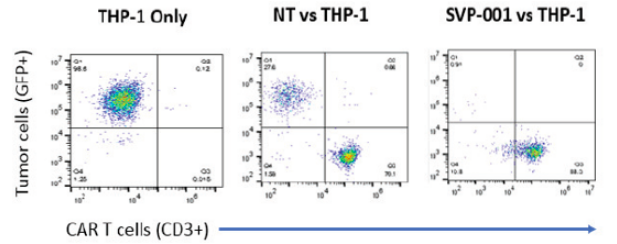Chimeric Antigen Receptor (CAR) T cells are making headlines with their recent FDA approvals and ability to eradicate cancers. Most CAR T therapies target tumor cells via a tumor associated antigen (TAA). Unfortunately, TAAs are also expressed on non-cancerous tissues, leading to significant risk for patients. SSX2 protein expression is restricted to germline cells and is frequently expressed in cancer. The p41-49 peptide fragment of SSX2 is displayed by the major histocompatibility complex (MHC) on tumor cells and then activates cytotoxic T cells.
Our inventors created the first antibody and CAR to target the SSX2(41-49) peptide. Targeting this peptide can greatly reduce non-specific targeting of normal tissues by therapeutic antibodies or CAR T cells. SSX2 is expressed in melanoma, prostate cancer, lymphoma, multiple myeloma, pancreatic cancer, and others. The SSX2(41-49) targeting CAR T cells demonstrated efficacy in killing an acute monocytic leukemia cell line (THP-1) in vitro. Experiments are planned to test the novel CAR T cells in vivo.

Figure: SSX241-49 targeting CAR T cells (SVP-001) eradicate the THP-1 cells in vitro (right), whereas T cells without the CAR fail to kill a large population of THP-1 cells (middle).
Applications:
- Cell therapy for cancer
- Therapeutic antibodies for cancer
Advantages:
- Reduced non-specific targeting improves toxicity profile